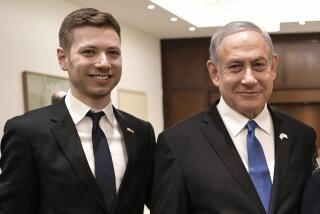Sharon Found to Be Defamed : Israeli Wins First Round in His Suit Against Time
- Share via
NEW YORK — Former Israeli Defense Minister Ariel Sharon won the first step in his $50-million libel suit against Time magazine Wednesday when a jury ruled that a 1983 Time magazine cover story about Sharon was defamatory.
After roughly 14 hours of deliberations, the panel of four men and two women decided that the Time paragraph at issue in the case said, in effect, that Sharon “consciously intended to permit” Christian Lebanese militia to massacre Palestinian civilians in West Beirut refugee camps in September, 1982.
The jury then deliberated for 6 1/2 more hours on other issues to determine whether Sharon was libeled.
On hearing the partial verdict, Sharon looked defiantly around the courtroom, breaking into a faint smile only when he looked at his wife, Lili, beside him. Later, he walked a semi-circle around the U.S. District Courthouse for television cameras.
Wednesday’s ruling was just the first in a four-stage test Sharon must pass to win his libel suit. The jury must now decide whether the defamatory paragraph is untrue and whether Time printed it with malice or with reckless disregard for the truth.
Then, if necessary, in a second part of the trial, the jury must hear testimony and rule on whether the paragraph has actually damaged Sharon’s reputation. Only if it rules that there had been such damage would libel be established. In that case, the jury would next determine how much compensation Sharon deserved.
After the partial verdict was announced, Time issued a statement saying that “the jury completely misread what Time said.”
Time magazine Managing Editor Ray Cave said that “there is still a long way to go” before the case is decided.
‘Pleased That We Won’ In response, Sharon told reporters, “I’m pleased that we won on this point. I am sorry that Time magazine is charging that the jury does not understand plain English.”
In the paragraph at issue, Time reported that Sharon “discussed the need for revenge” with Lebanese leaders the day before he allowed the Christian militia to enter the Sabra and Shatilla refugee camps, where they massacred hundreds of refugees.
The jury Wednesday decided that “the paragraph in context states that, in permitting the Falangists (the Lebanese militia) to enter Sabra and Shatilla, Minister Sharon consciously intended to permit the Falangists to take acts of revenge extending to the deliberate killing of noncombatants in the camps.”
However, the jury said that the paragraph did not suggest that Sharon “actively encouraged” the massacre, something Sharon’s attorneys had alleged the paragraph implied.
Secret Appendix Cited In the original paragraph, Time reported also that details of Sharon’s alleged conversation were contained in a secret Appendix B of an Israeli government report on the massacre, an allegation Time now concedes was incorrect.
In its partial verdict, the jury ruled that “the defamatory effect of the paragraph was aggravated by Time’s statement that details of the alleged conversation were contained in Appendix B . . . .”
If the jury finds that the paragraph was false, it could find that Time committed libel if it decides that Time fabricated the element about Appendix B. Time already has admitted that it “inferred” this element.
Cave told reporters after the partial verdict that Time still stood by every element of its story and would not want to rephrase any of it were it doing the story now, except for its allegation about Appendix B.
Issue of Damages Time attorney Thomas Barr told reporters that, even if the jury finds that Time libeled Sharon, the magazine technically would still win the case if the jury found that Sharon’s reputation was not damaged by the libel and refused to award him damages.
Attorneys said that the jury appears unusually methodical in its deliberations, discussing each question first and then requesting all exhibits relevant to the question.
To aid the process, the jurors have asked for such items as a blackboard, manila envelopes, a staple gun, a “quality” dictionary, toothpaste, cough syrup and space heaters to warm the jury room.
More to Read
Sign up for Essential California
The most important California stories and recommendations in your inbox every morning.
You may occasionally receive promotional content from the Los Angeles Times.












